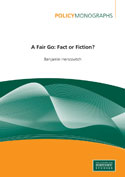
The ‘fair go’ is a core Australian value. The idea that everyone should have the opportunity to improve their lot in life is a central element of Australia’s social contact and a touchstone for assessing public policy. But what exactly does it mean? And does Australia live up to this ideal?
The fair go is best understood in terms of opportunity rather than equality. Not only is the egalitarian principle of equal distribution only supported by a small minority of Australians, but no society can ensure that everyone starts from the same position. Instead of equalising everyone’s starting points in life, a fair go gives individuals the opportunity to improve their position in society with the right combination of ambition and natural ability.
Despite periodic claims that the fair go is under attack, rates of social mobility reveal that Australia is a fair go success story.
Individuals from all backgrounds move into every socioeconomic stratum in large numbers.
Approximately 17% of sons born into the wealthiest quintile drop to the poorest, while12% of sons
born into the poorest quintile make it to the wealthiest. At the same time, almost 1 in 10 children of fathers with the highest status jobs end up with the lowest status jobs, and slightly more than 1 in 4 children of fathers with the lowest status jobs work their way into the highest status jobs.
Australia also has some of the highest rates of earnings and educational mobility in the industrialised world. The earnings advantage wealthy fathers confer on their sons is well below most OECD countries. Equally, the children of parents who did not finish secondary schooling are more likely to attain tertiary education in Australia than in other industrialised countries, while having parents with a post-secondary education confers a relatively small educational advantage.
The Australian ideal of a fair go is fact rather than fiction. By offering all individuals the opportunity to capitalise on their ambition and natural ability, Australia’s dynamic and socially mobile society neither safeguards the position of the privileged nor frustrates the aspirations of the disadvantaged.
Benjamin Herscovitch is a Policy Analyst at The Centre for Independent Studies.










